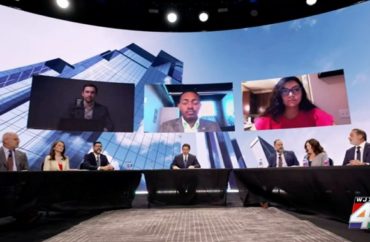
‘It’s become a means to advocate a political ideology of the left,’ Florida University System Chancellor Ray Rodrigues said
Florida Gov. Ron DeSantis recently hosted a roundtable discussion with top Florida educational and political leaders on the “divisive topics” of diversity, equity, and inclusion and critical race theory and their impact on higher education.
Participants at the West Palm Beach, Fla., panel included Florida Education Commissioner Manny Diaz, State University System Chancellor Ray Rodrigues, New College of Florida Trustee Christopher Rufo and Scott Yenor of the Claremont Institute, according to a news release from the governor’s office.
“Equal opportunity for all—that was DEI in concept,” Rodrigues said, opening the discussion. “What we’ve seen is DEI in practice . . . has been much different. Instead of being unifying, we see it as being divisive, an attempt to cancel those who don’t agree.”
“It’s become a means to advocate a political ideology of the left, and it has ignored merit and instead sought to provide equal outcomes, not based on the merit of the individual or the work but instead on their physical characteristics, which is exclusionary, not inclusive,” Rodrigues said.
DEI has interfered with the core purposes of the university, namely “the pursuit of truth, the communication of that discovered truth, and the selfless acts of others, that is, service” Rodrigues said.
Roger Tovar, vice chair of the Florida International University Board of Trustees, said “A lot of us on the board were surprised to see the amount of money that’s being spent on these initiatives.”
“I think [these initiatives] were well intentioned to start but for whatever reason they go off the rail[s].”
Other panelists took a less conciliatory tone.
“The first thing to understand about DEI is that what it’s become in practice is a vehicle for left-wing political activists to hijack public resources and turn universities away from the pursuit of knowledge and toward the pursuit of their own private political interests,” Rufo said.
Rufo urged listeners to “take a look at the specifics [and] get beyond the Orwellian word games that all sound good in theory” to understand what DEI does in practice.
Rufo also highlighted his investigative journalism, through which he claims to have identified four key behaviors associated with DEI in higher education. Rufo claimed that DEI offices are morphing into ideological programs pushing CRT as the default university ideology and that universities are creating hiring practices that reward race over the quality of scholarship.
Rufo also identified racially segregated student programs and scholarships and claimed universities are turning students into left-wing activists by promoting only left-wing social activism.
Rufo concluded by singling out New College of Florida’s decision to abolish its DEI office, which he highlighted as a “model [that] can be replicated through legislation throughout the Florida public university system.”
For Yenor’s part, he said the “driving force for radicalizing universities . . . used to be a bottom-up problem” led by students. Now, he added, “it’s kind of a top-down problem” led by administration.
Yenor also highlighted the Claremont Institute’s recent report on DEI in Florida universities.
“To ordinary Americans, DEI sound[s] like a promise to provide welcome and opportunity to all on campus,” according the report.
“In reality, DEI represents a set of radical political and social views that are turning our universities against America’s most cherished values,” according to the report’s executive summary.
“The guiding principles of DEI are: [w]hite America harbors unconscious racism (implicit racism) against blacks; [e]qual rights, free speech, meritocracy, and the law reinforce a regime of white supremacy as old as the United States itself; and [o]nly through tearing down meritocracy, equal rights, and free speech can ‘underrepresented minorities’ become free,” according to the report.
The report found almost all four-year public universities in Florida employed “a central administrator dedicated to promoting DEI values” and that most Florida universities had “a strategic plan for promoting DEI and a committee charged with overseeing and furthering this vision.”
The College Fix reached out to the panelists, either directly or through their offices, and to four DEI officials at two Florida universities on March 27.
Rufo was unavailable for comment, a DEI official at Florida State University declined to comment, and the other panelists were not immediately available for comment.
MORE: A debate on DEI will be held at MIT. The university’s DEI deans refuse to participate.
IMAGE:News4JAX The Local Station/YouTube





Please join the conversation about our stories on Facebook, Twitter, Instagram, Reddit, MeWe, Rumble, Gab, Minds and Gettr.